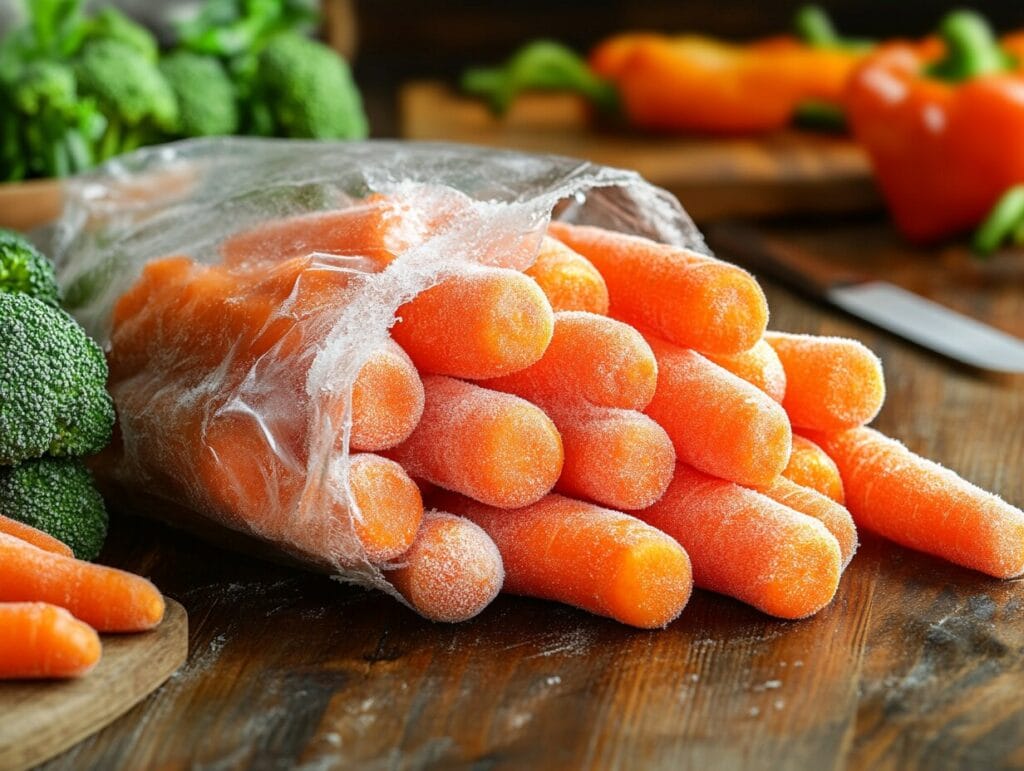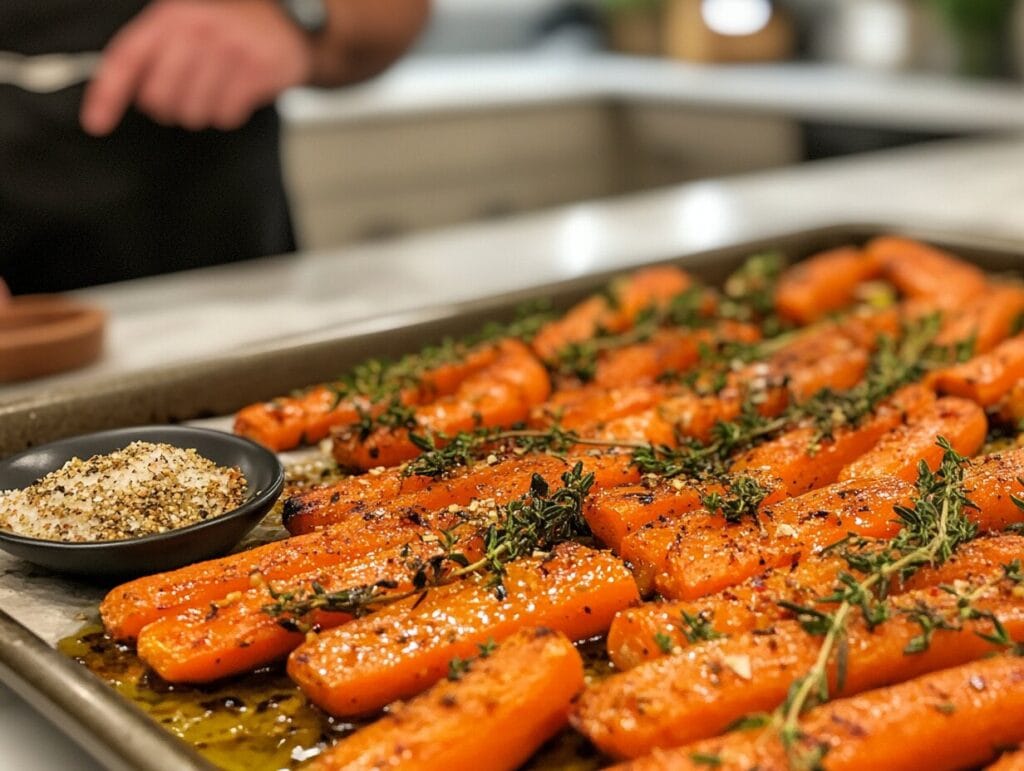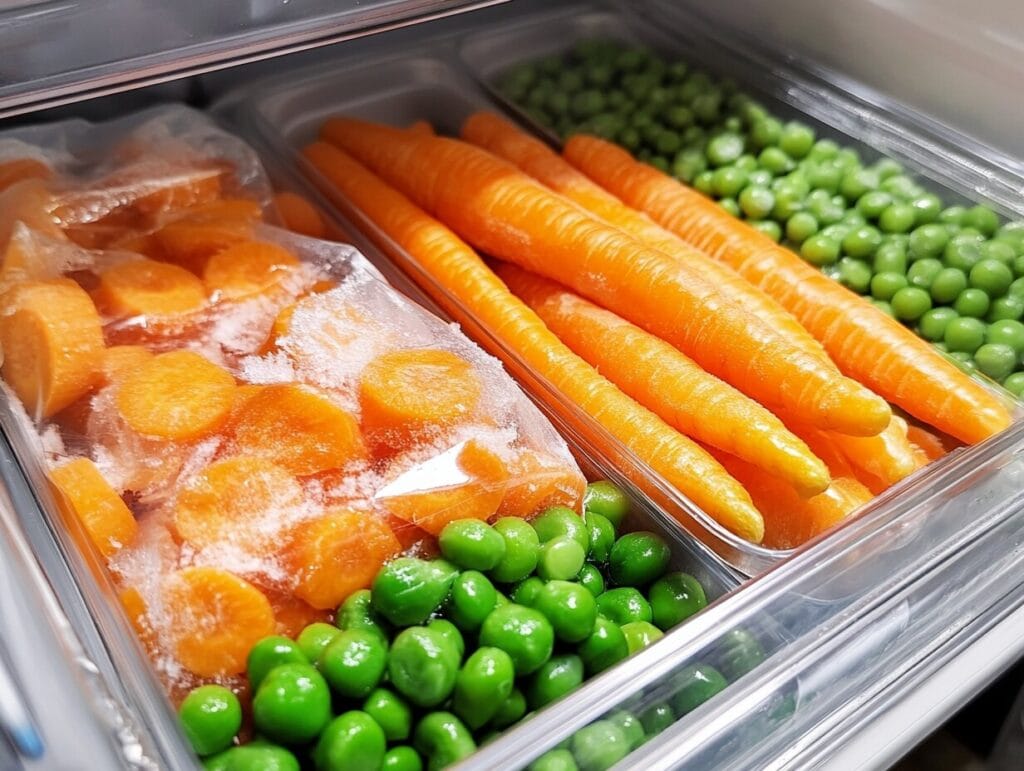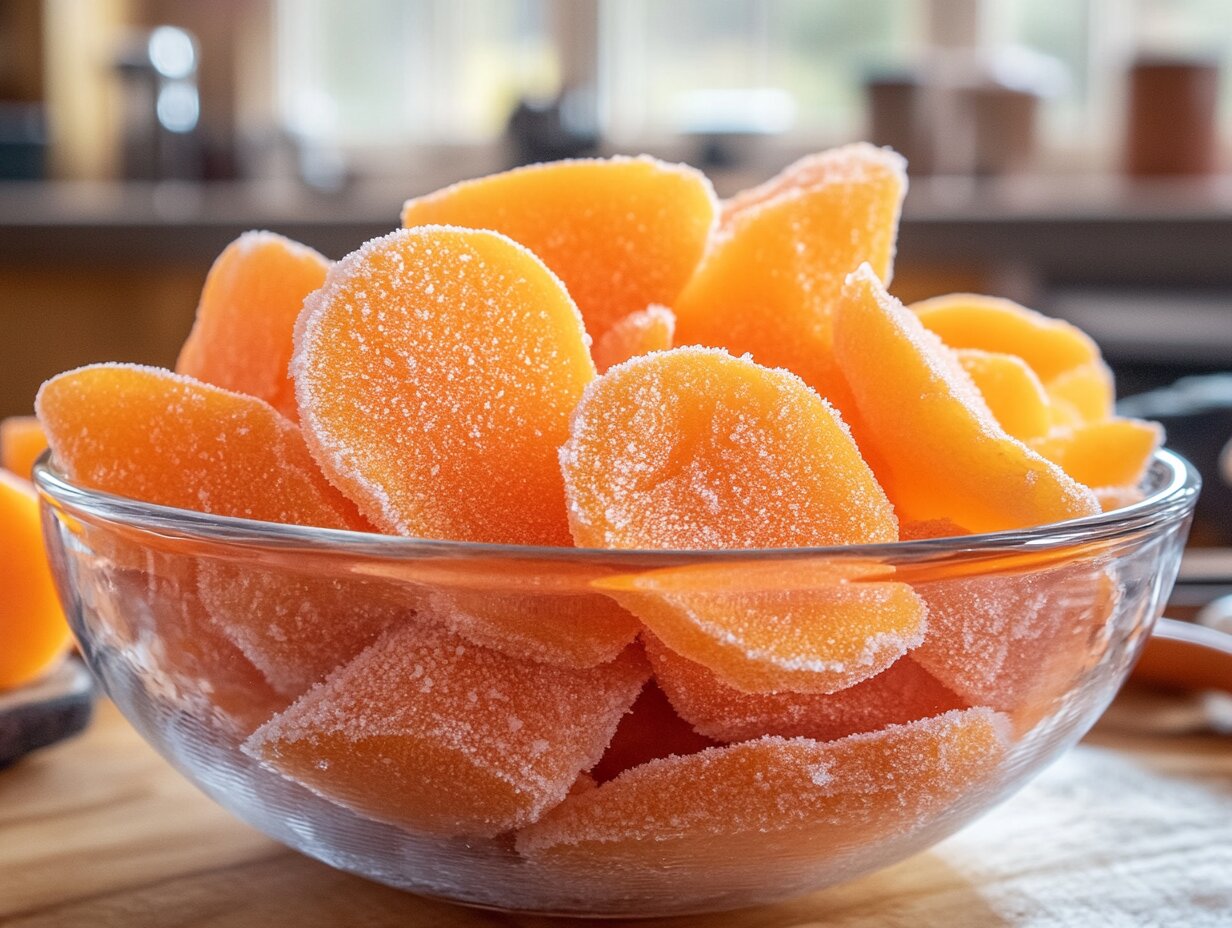Frozen carrots are a lifesaver for busy cooks and budget-conscious households. Whether you need a quick side dish, a base for hearty soups, or an ingredient for creative desserts, frozen carrots can do it all. In this guide, we’ll explore creative ways to cook with frozen carrots, solve common cooking challenges, and share tips for making the most of this freezer staple.
Frozen carrots are not just convenient—they’re also incredibly versatile. They’re harvested and frozen at peak ripeness, locking in their nutrients and vibrant color. Unlike fresh carrots, which can spoil quickly, frozen varieties are always ready when you are.
Plus, they come pre-washed and often pre-chopped, making meal prep faster and easier. With their long shelf life, frozen carrots reduce food waste and help you save money. What’s not to love?
Why Choose Frozen Carrots Over Fresh Ones?
If you’ve ever debated between fresh and frozen carrots at the store, you’re not alone. The truth is, both have their merits, but frozen carrots hold some surprising advantages that might just sway your decision.
Nutritional Value of Frozen Carrots

You might wonder: are frozen carrots as nutritious as fresh ones? Absolutely! In many cases, they’re even better. Since they’re flash-frozen shortly after harvest, their vitamins—like beta-carotene (hello, glowing skin!)—and minerals are well-preserved.
Fresh carrots, on the other hand, can lose nutrients during transportation and storage. So, unless you’re pulling carrots straight from your garden, frozen varieties often pack a nutritional punch.
Convenience and Cost-Effectiveness
Let’s face it: life gets busy. Who has time to peel and chop carrots every single day? Frozen carrots eliminate that hassle. They’re prepped and ready to go, making weeknight cooking a breeze.
Oh, and the cost savings? Fresh produce can be pricey, especially if it goes bad before you use it. With frozen carrots, you only pay for what you eat—no more tossing limp carrots from the fridge into the trash.
Best Ways to Prepare Frozen Carrots
Now that we’ve established why frozen carrots deserve a spot in your freezer, let’s talk about how to prepare them. Spoiler alert: it’s super easy, and you don’t need to be a culinary expert to get it right.
Cooking Methods for Frozen Carrots
Cooking frozen carrots is as straightforward as it gets. You can steam, sauté, boil, or roast them depending on the recipe. Here’s a quick rundown:
- Steaming: Retains the most nutrients and keeps the carrots vibrant.
- Sautéing: Adds a caramelized flavor for stir-fries or side dishes.
- Boiling: Perfect for soups or stews where they’ll soften beautifully.
- Roasting: Enhances sweetness and creates a slightly crispy texture.

Want a pro tip? Don’t overcook them! Frozen carrots are partially cooked during the freezing process, so they don’t need as much time as fresh ones.
Thawing Tips for Optimal Flavor
Here’s a little secret: in most cases, you don’t even need to thaw frozen carrots before cooking. But if your recipe calls for it, here’s how to do it right:
- Place them in the fridge overnight for slow, even thawing.
- Use the microwave for a quick defrost if you’re in a hurry.
- Avoid thawing at room temperature to prevent mushiness.
Remember, thawing can slightly affect texture, so it’s best to cook them directly from frozen when possible.
Delicious Recipes Using Frozen Carrots
Frozen carrots aren’t just a convenience—they’re a culinary chameleon, fitting into countless recipes. From hearty soups to refreshing smoothies, they can do it all.
Soups and Stews with Frozen Carrots
Frozen carrots are a perfect addition to soups and stews. They soften beautifully and release their natural sweetness, enhancing the overall flavor. Whether it’s chicken noodle soup, a hearty beef stew, or a simple vegetable broth, carrots bring warmth and color to every bowl.
Imagine a rich, creamy carrot soup garnished with a dollop of yogurt and fresh herbs—delicious, right?
Stir-Fry Dishes Featuring Frozen Carrots
Frozen carrots shine in stir-fries thanks to their crisp texture and bright color. Pair them with broccoli, bell peppers, and your favorite protein for a quick, healthy meal. Add a splash of soy sauce, sesame oil, and ginger for that irresistible umami kick.
Baked Casseroles and Gratins
Looking for comfort food with a twist? Incorporate frozen carrots into casseroles or gratins. They pair beautifully with creamy sauces and melted cheese, creating a dish that’s hearty, satisfying, and packed with hidden veggies.
Smoothies and Juices Incorporating Frozen Carrots
Yes, you can even use frozen carrots in drinks! Blend them with oranges, ginger, and a touch of honey for a refreshing smoothie that’s bursting with flavor and nutrients.
Think of it as sunshine in a glass—perfect for jumpstarting your morning or recharging after a workout.
Creative Uses for Frozen Carrots in Everyday Cooking
Frozen carrots are more than just a side dish. They’re a culinary canvas waiting for your creative touch. From baby food to indulgent desserts, these vibrant orange gems can transform your cooking in ways you might not expect.
Carrot Puree for Baby Food or Sauces
If you’ve got a little one at home, frozen carrots can be your best friend. Just steam and blend them into a smooth puree, and you’ve got nutritious, homemade baby food that’s free of preservatives and artificial flavors.
But wait—it doesn’t stop there! Carrot puree isn’t just for babies. Use it as a base for soups, curries, or even pasta sauces. Its natural sweetness pairs beautifully with spices like cinnamon, nutmeg, or cumin, giving your dishes a unique flavor profile.
Frozen Carrots in Quick Snacks and Side Dishes
Need a quick snack or side? Frozen carrots have got your back. Toss them in olive oil, sprinkle with your favorite seasonings, and roast them to perfection. They’ll come out sweet, slightly crispy, and totally addictive.
Or, try glazing them with a mix of honey and butter for a dish that feels gourmet but takes mere minutes to prepare. They’re perfect for when unexpected guests show up, and you need to impress!
Enhancing Desserts with Frozen Carrots
Believe it or not, frozen carrots can shine in desserts too! Carrot cake is the obvious choice, but why not think outside the box? Add finely grated frozen carrots to muffins, cookies, or even pancake batter for a pop of color and moisture.
Feeling adventurous? Try making carrot ice cream or a spiced carrot parfait. Trust us—it’s the kind of treat that makes people ask, “What’s your secret ingredient?”
Common Problems When Using Frozen Carrots
While frozen carrots are super convenient, they’re not without their quirks. But don’t worry—we’ve got solutions to tackle the most common issues you might face.
Avoiding Texture Issues in Cooking
One common complaint about frozen carrots is that they can turn mushy after cooking. This happens because the freezing process slightly breaks down their cell structure.
To avoid this, use quick-cooking methods like sautéing or roasting. These techniques help retain their firmness and prevent them from becoming overly soft.
Another tip? Don’t overcrowd the pan. Cooking in batches allows the carrots to caramelize instead of steaming in their own moisture.
Preventing Overcooking and Flavor Loss
Overcooked carrots can lose both flavor and appeal. Keep an eye on cooking times—frozen carrots generally need less time than fresh ones.
For soups and stews, add them towards the end of cooking to ensure they don’t disintegrate into the broth. And if you’re boiling them, a pinch of salt can enhance their natural sweetness.
Storage and Handling of Frozen Carrots

Proper storage is key to maintaining the quality of your frozen carrots. Let’s ensure your stash stays fresh and ready to use.
How to Store Frozen Carrots Properly
When you buy a bag of frozen carrots, make sure to transfer any leftovers into an airtight container or resealable freezer bag. This minimizes exposure to air, which can cause freezer burn.
Store them at a consistent temperature of 0°F (-18°C) or below. Fluctuating temperatures can lead to ice crystal formation, which affects the texture.
Identifying Signs of Freezer Burn or Spoilage
Freezer burn isn’t harmful, but it can make your carrots taste bland or off. Look for white, frosty patches or dry, shriveled pieces. If you spot these signs, those carrots are best used in recipes where texture isn’t critical, like soups or purees.
For spoiled carrots, trust your senses. If they smell sour, have an unusual color, or are covered in ice that looks cloudy, it’s time to toss them.
Comparing Frozen Carrots with Other Frozen Vegetables
Carrots aren’t the only star of the frozen food aisle. How do they stack up against other frozen veggies? Let’s find out!
Advantages of Frozen Carrots Over Other Options
Unlike some veggies that can lose their flavor or texture during freezing, carrots hold up remarkably well. Their sweetness remains intact, and their vibrant color makes any dish look more appetizing.
Plus, they’re incredibly versatile. From sweet to savory, there’s virtually no dish that doesn’t pair well with carrots. Compare that to frozen spinach or peas, which have more specific uses.
Combining Frozen Carrots with Other Vegetables
Why stop at just carrots? Combine them with frozen peas, corn, or green beans to create a colorful medley. Toss them into fried rice, pasta salads, or casseroles for a balanced, visually appealing meal.
The mix-and-match possibilities are endless, making frozen carrots a team player in the kitchen.
Tips for Buying High-Quality Frozen Carrots
Not all frozen carrots are created equal. Here’s how to pick the best ones for your recipes.
Reading Labels for Nutritional Information
Always check the label! Look for frozen carrots with no added salt, sugar, or preservatives. The ingredient list should be simple: just carrots.
Pay attention to the packaging date as well. While frozen foods have a long shelf life, fresher products often taste better.
Choosing Organic vs. Conventional Frozen Carrots
If organic is important to you, there are plenty of options on the market. Organic frozen carrots are grown without synthetic pesticides or fertilizers, making them a great choice for health-conscious consumers.
That said, conventional frozen carrots are still a healthy and affordable option, especially if you’re on a budget.
Frozen Carrots for Health and Diet Plans
Frozen carrots aren’t just tasty and convenient—they’re also a fantastic addition to any health-conscious diet. Packed with vitamins, fiber, and antioxidants, they can support everything from weight loss to glowing skin. Let’s explore how to make the most of these nutritional powerhouses.
Incorporating Frozen Carrots into Weight-Loss Meals
Trying to shed a few pounds? Frozen carrots are a dieter’s dream. They’re low in calories but high in fiber, meaning they keep you full without tipping the scale. Toss them into soups, salads, or stir-fries for a guilt-free way to bulk up your meals.
Craving a snack? Swap out chips for roasted frozen carrots seasoned with paprika and garlic. They’re crunchy, satisfying, and packed with natural sweetness.
Meeting Daily Vitamin Needs with Frozen Carrots
Carrots are famous for their beta-carotene, which your body converts into vitamin A. This vitamin is essential for eye health, immune function, and even your skin’s natural glow.
Just one serving of frozen carrots can cover more than half of your daily vitamin A needs. Pair them with a source of healthy fat—like olive oil or avocado—to boost absorption.
Making the Most of Frozen Carrots
Frozen carrots are more than just a backup plan—they’re a versatile, nutritious, and budget-friendly staple that deserves a starring role in your kitchen. From soups to desserts, they can elevate your meals while saving you time and money.
Whether you’re a busy parent, a health enthusiast, or simply someone who loves experimenting in the kitchen, frozen carrots are here to make life easier (and tastier). So, the next time you’re staring at that bag in your freezer, remember: the possibilities are endless!
Freezing is a great way to preserve vegetables, but knowing how to cook them properly is key. Learn how to cook frozen carrots to maintain their flavor and texture.
FAQs About Frozen Carrots
What are some quick recipes for using frozen carrots?
Try adding them to stir-fries, soups, or even roasting them with olive oil and spices for a quick side dish. They’re also great in casseroles or pureed into sauces.
Do frozen carrots lose nutrients during freezing?
Not at all! Frozen carrots are flash-frozen at peak ripeness, preserving their nutrients. In some cases, they can even be more nutritious than fresh carrots that have been sitting for a while.
Can I eat frozen carrots raw?
Technically, yes, but they’re usually blanched before freezing, which softens them slightly. They’re best enjoyed cooked for optimal texture and flavor.
How long do frozen carrots last in the freezer?
When stored properly in an airtight container or bag, frozen carrots can last up to 12 months. Always check for signs of freezer burn before using.
Can frozen carrots be used in baking?
Absolutely! Grated frozen carrots work beautifully in carrot cakes, muffins, and even pancakes. Just thaw and pat them dry before adding to your batter.
Are frozen carrots safe for baby food?
Yes! Frozen carrots are a safe, nutritious, and convenient option for making homemade baby food. Simply steam and puree them to your desired consistency.
Check out these Delicious Chicken Breakfast Recipes for inspiration.

